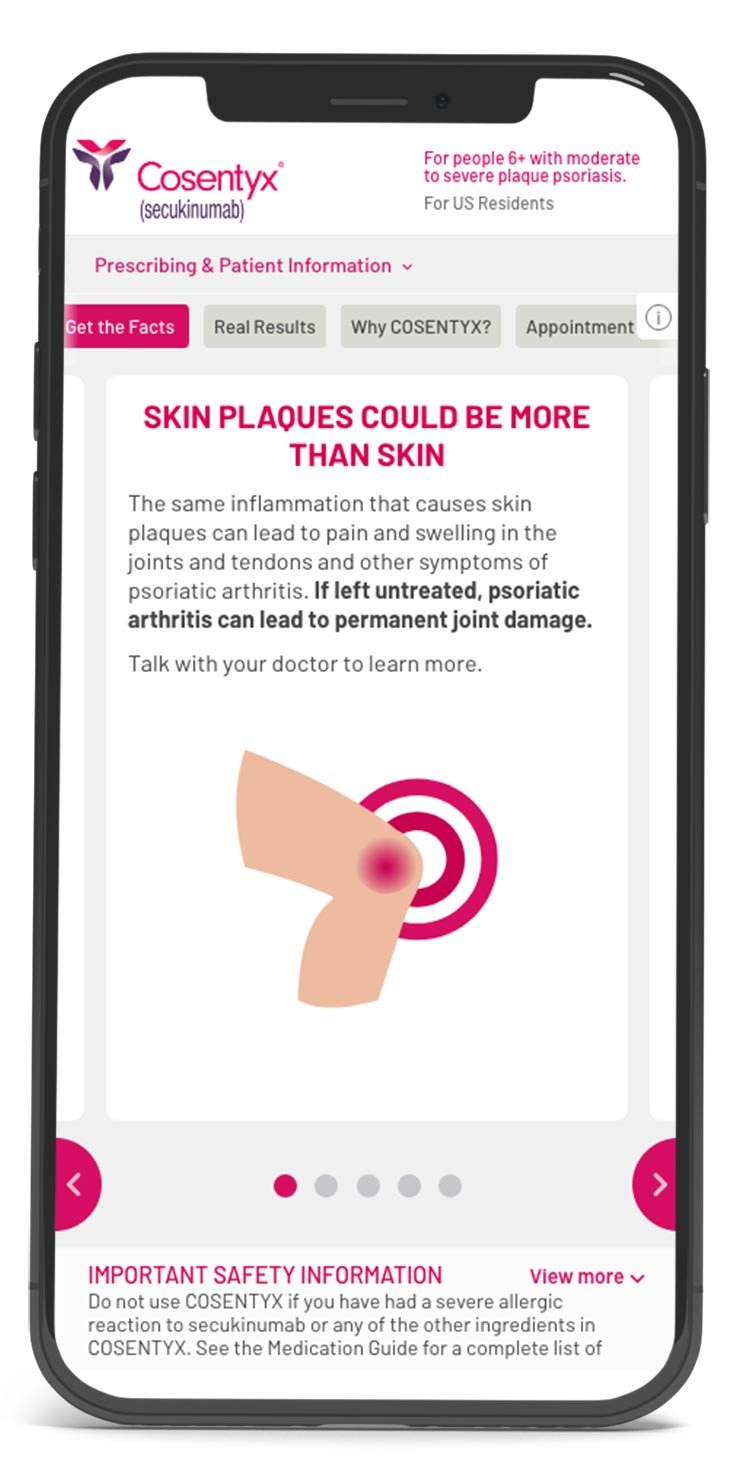For people 6+ with moderate to severe plaque psoriasis

Learn about Cyndi, Michelle, & Dewey's treatment journey with COSENTYX® (secukinumab)
Plaque Psoriasis & Psoriatic Arthritis
Cyndi Lauper, Chef Michelle Bernstein, and professional wrestler Dewey share their experiences with plaque psoriasis and psoriatic arthritis—how they’ve managed their busy lives, their condition, and what treatment with COSENTYX has been like for them.
Cyndi and Dewey, actual patients with plaque psoriasis, Michelle, actual patient with psoriatic arthritis, and Dr. Panico were compensated for their time. Individual results may vary.
Still Working With Cyndi, Michelle, and Dewey
Cyndi and Michelle team up again in New York City to meet a professional wrestler and plaque psoriasis advocate, Dewey. Together, they learn more about Dewey’s wrestling experience over the past 20 years and how he confided in his confidant and wrestling partner, Rob, who helped get him through the difficult times he had with his plaque psoriasis symptoms. Being open and honest with Rob helped Dewey to advocate for himself with his dermatologist to find a treatment that works for him, and it’s still working, COSENTYX.
Keep Fighting, Don’t Let Plaque Psoriasis Beat You Down.
Cyndi, Michelle, and Dewey continue to learn more about each other and their experiences with plaque psoriasis and psoriatic arthritis, including the possible connection and risks if left untreated. Dewey takes them backstage to see what it’s like to prepare for a wrestling match and explains how he is able to show off more skin with his outfit since finding relief that can last with COSENTYX.
Still Working With Cyndi and Michelle
Cyndi and Michelle share what it’s like living with plaque psoriasis and psoriatic arthritis, the possible connection between their conditions, and how they spoke up and talked to their doctor to find real relief with COSENTYX. Watch as they share their stories in their hometowns, first at a photoshoot and podcast filming in NYC with Dr Panico, then preparing a meal for the community in Miami.
Don’t Wait to Treat Plaque Psoriasis
Cyndi, Michelle, and Dr Brittany Panico talk about plaque psoriasis and why you shouldn’t let your symptoms go untreated. Learn how you could be at risk for developing psoriatic arthritis if you ignore skin, scalp, nail, or joint symptoms and how to better prepare for your next doctor’s visit. Learn more and check out the video above, if you haven’t already, The Plaque Psoriasis and Psoriatic Arthritis Connection where Michelle talks about her experience with psoriatic arthritis and the possible connection it could have to plaque psoriasis.
COSENTYX in Plaque Psoriasis: Results fast. Clear skin that can last.
In clinical trials, 6 out of 10 people taking COSENTYX 300 mg were clear or almost clear at 12 weeks vs ~5% taking placebo. Approximately 8 out of 10 people saw 75% skin clearance compared to those not taking COSENTYX.
Many who saw results at 1 year maintained them at 5 years.†
†After 3 years, patients and doctors were told which medication was being used. Knowing the study drug being used may affect the results.
Managing Psoriatic Arthritis Symptoms
Michelle opens up to Cyndi about her psoriatic arthritis symptoms and how she was able to get them under control. Together they prepare meals for the community while having a heart-to-heart about living and working with their conditions.
COSENTYX in Psoriatic Arthritis: Relief that can last
Up to 60% of patients taking COSENTYX 150 mg in a clinical trial saw at least a 20% improvement in psoriatic arthritis symptoms at 16 weeks versus 18% of patients taking placebo.
For patients who continued on COSENTYX for 5 years, a similar percentage saw an improvement in psoriatic arthritis symptoms.‡
‡In this study, the medication being used was revealed to doctors and patients after 1 year, which may affect the results.
The Plaque Psoriasis and Psoriatic Arthritis Connection
Certified rheumatologist Dr Brittany Panico brings awareness to the possible connection between plaque psoriasis and psoriatic arthritis. She shares why it's important to get specific with your doctor about all the symptoms you’ve experienced so that they can help find a treatment that works for you.
Give your doctor the full picture of your health and go to your next visit prepared by completing this Doctor Discussion Guide.
Speaking Up to Find Relief from Plaque Psoriasis and Psoriatic Arthritis
Cyndi and Michelle discuss self-advocacy and why it matters so much when it comes to your health. Discuss your plaque psoriasis or psoriatic arthritis symptoms with your doctor. By speaking up and working with their doctors, Cyndi and Michelle were able to find a treatment that works for them.
Open up about PsO with our doctor conversation starter.
It’s important to be open about your PsO symptoms. Learn how our doctor conversation starter can help support you at your next doctor visit.

Discover Everything COSENTYX® Offers
Sign up for a personalized resource to see everything COSENTYX offers all in one place. From information about COSENTYX, real patient stories, and savings options, to tips and tools for talking with your doctor, you’ll find it all here.
Want to learn more about COSENTYX for psoriatic arthritis and plaque psoriasis?
